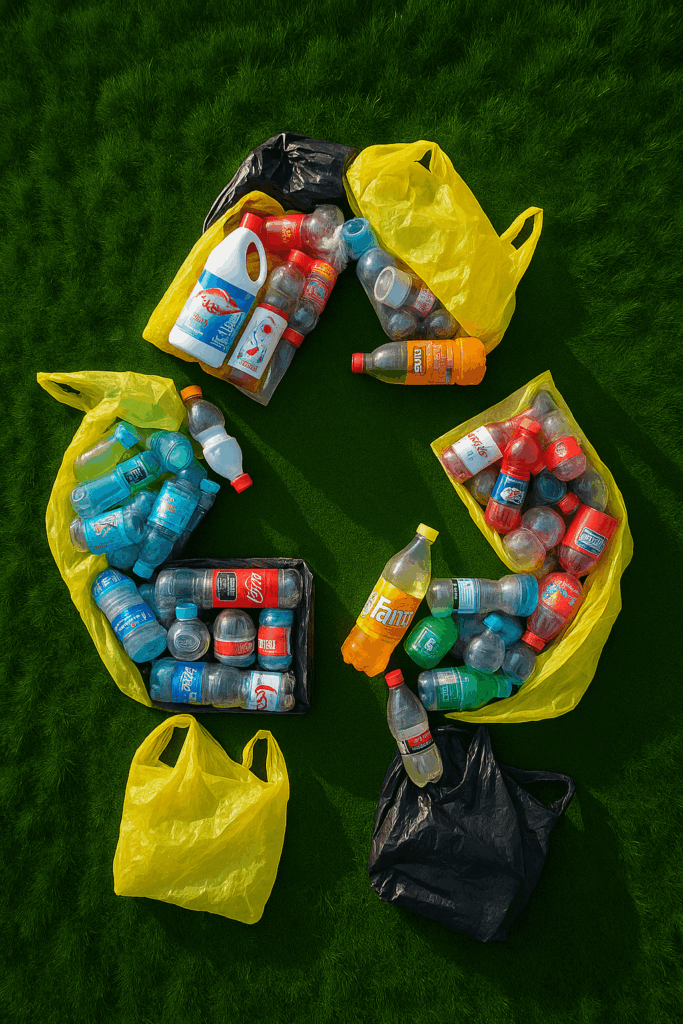The Complexity of Plastic Sorting
Plastics come in a variety of types, each with unique properties and applications. Some of the most commonly used plastics include PET (Polyethylene Terephthalate), typically found in beverage bottles; HDPE (High-Density Polyethylene), commonly used for FMCG & Cosmetic applications; and PP (Polypropylene), which is found in plastic packaging materials, plastic parts, and textiles.
However, a mixed plastic waste stream is far more complex than just its base material. Unlike uniform waste streams, it often consists of a diverse assortment of plastics with varying compositions and properties. For instance, capped, labelled, and aluminium-ringed bottles are frequently mixed with other kinds of plastic waste, such as flexible packaging, multilayered films, and rigid containers. Each of these materials behaves differently during processing of waste for circular recycling, requiring specialized sorting techniques.
Beyond the type of plastic, recyclers must navigate additional complexities that significantly impact the efficiency and effectiveness of the recycling process. They need to differentiate between food-grade and non-food-grade plastics, as the latter may contain hazardous substances that render them unsuitable for Food-contact applications.
Similarly, distinguishing between plastics used in cosmetic packaging versus industrial-use applications is crucial, as the additives and chemical residues in these materials can alter the recyclability of the final product. Additionally, sorting plastics based on color—whether transparent, opaque, or colored—further complicates the process, as color contamination can limit the reuse of recycled plastic in high-quality applications.
A major challenge in this system is the lack of precise segregation techniques, which leads to high contamination levels. When plastics of different grades and applications are recycled together without proper sorting, the resulting mixed waste is often downcycled into lower-quality materials rather than being fully recycled into high-value products. This not only diminishes the economic viability of recycling but also results in significant material loss.
Contamination remains one of the most pressing obstacles to achieving true plastic circularity. Even a single contaminated batch—whether due to incompatible polymers, or non-recyclable additives—can compromise the integrity of the recycled plastic, making it unsuitable for premium applications such as food packaging or medical-grade materials. Consequently, this leads to wasted resources, increased processing costs, and an overall inefficient recycling loop.
Revolutionizing Recycling with AI-Powered Sorting
A better and more efficient recycling system requires an accurate and efficient sorting mechanism. If contamination can be eliminated by precise sorting, recyclers can ensure higher-quality recycled plastics, reduce waste, and improve the economic feasibility of plastic circularity. This is where AI-powered sorting solutions are transforming the industry
Our Netra® AI technology can detect brands, polymer types, and applications, ensuring recyclers receive pure, uncontaminated input bales and produce high quality recycled pellets.
By leveraging our AI-powered sorting solutions, recyclers can increase material recovery rates, reduce contamination, and lower operational costs. Our technology is not just improving the efficiency of plastic recycling; it is making plastic circularity a commercially viable and sustainable reality.
As the industry moves towards smarter, data-driven recycling processes, AI is becoming a necessary innovation for companies striving for a more sustainable and efficient circular economy.
At Ishtiva®, we are committed to helping recyclers maximize material recovery, reduce environmental impact, and build a smarter, faster, and more sustainable plastic recycling system.
The future of recycling is AI-powered—are you ready to be part of it?
